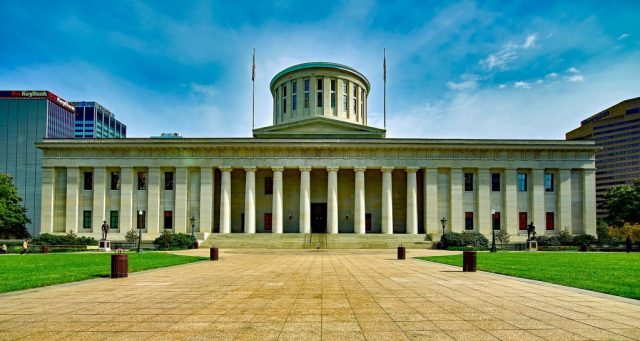
House Speaker Matt Huffman said more override votes are likely when lawmakers return this fall
By: Nick Evans – July 21, 2025 5:17 pm

Rep. Bill Roemer, R-Richfield. (Photo by Nick Evans, Ohio Capital Journal.)
Ohio House Republicans voted Monday to override a Gov. Mike DeWine veto of a provision in the state budget restricting the kinds of local levies that can be put to voters. The override now goes to the Ohio Senate to consider.
The House only voted on one of three overrides leaders had put on the schedule related to property taxes. Ohio House Speaker Matt Huffman insisted the two remaining vetoes, not to mention a couple others, could be on the docket when lawmakers return this fall.
“I think if we have more discussion, that we’ll come back in October, it’s my expectation that we will take veto overrides on those two and likely some others also,” Huffman said following the vote.
In Monday’s session, the Ohio House voted 61-28 to override DeWine’s veto of a provision that removes local authority to put replacement property tax levies and certain emergency levies on the ballot.
With the matter now heading to the Senate, chamber budget chief Sen. Jerry Cirino, R-Kirtland, is wrangling members for their own vote.
“We’re working on dates on the Senate coming back,” he said on a recent Senate podcast. “We had some members traveling, some out of the country, that would make coming back difficult to do because we need more votes to override a veto than we would ordinarily have to pass a bill.”
GET THE MORNING HEADLINES.SUBSCRIBE
House session
Ahead of Monday’s session, it was clear that the vote would be close — 10 members couldn’t make it.
House members were forced to use the Senate chamber, as the House chamber is under renovation, and the unfamiliar setting led to some hiccups. Instead of sitting at their usual desks, lawmakers spread out to fill the Senate gallery benches. The House’s electronic vote boards absent, representatives cast their vote on iPads.
State Rep. Bill Roemer, R-Richfield, kicked off debate. The Ways and Means chairman helped lead a joint committee on property tax reform last year, and he had a pair of massive binders to prove it.
“This is half of our property tax study commission,” he said hoisting one of the binders. “We’ve got the other half here,” he added holding up the other.
Roemer claimed that the vast majority of people in Ohio do not know what a replacement levy is.
“They think, well, I’m just replacing it, I’m voting for the exact same thing that I did before. But in almost every instance that results in an increase in taxation.”
Republican lawmakers argue framing levies as a replacement, or an emergency skews the question in voters’ minds. State Rep. David Thomas, R-Jefferson, argued a veto override gives “power back to the homeowner.”
“When you go to the ballot, there will be simple questions,” Thomas said. “Do you want to increase your taxes? Do you want to keep your taxes the same? That is what we’re faced with. You will not see confusing language like replacement and substitute and inflammatory language like emergencies.”
And Thomas insisted the override vote “doesn’t decrease funding whatsoever,” for taxing authorities like school districts around the state. Instead, he argued the provision creates greater transparency when levies show up on the ballot.
“Our taxpayers then have the tools, have the knowledge, have the ability,” he said. “If they wish to fund their local entities they can do so.”

Democrats push back
Across the aisle, Democrats turned that argument back on Republicans.
“Our taxpayers desperately need relief,” Minority leader Dani Isaacsohn argued. “They need cash in their pockets so they go on vacations, so they can take their families out to dinner, so they can celebrate birthdays, so that they can afford to stay in the homes that they built their lives in.”
“Unfortunately,” he added, “overriding this veto does not provide any real relief for those homeowners.”
Isaacsohn said that the levies Republicans complain about are the predictable result of declining state support. State Rep. Beryl Brown Piccolantonio, D-Gahanna, laid out the cause and effect.
“Over the past two decades, the Republican majority in this state has repeatedly made a choice to invest less from the state level into our local communities,” she said. “When the state invests less, our schools and communities either have to cut critical services or they have to ask community members to pay higher property taxes.”
What’s next
The two remaining vetoes already identified by House leaders have to do with a provision giving county budget commissions increased control over levy amounts, and how to calculate a school district’s minimum millage, known as the 20-mill floor.
DeWine vetoed the provision related to the budget commission over concerns that local officials could overturn a levy after voters approved it. Huffman disputed that characterization.
The 20-mill floor provisions would alter a decades-old tax reduction formula. Put simply, it would allow for additional reductions in districts that have already reduced rates to the floor.
Huffman said lawmakers have brought up vetoes related to eminent domain, LGBTQ+ materials in libraries, and ending sales tax exemptions for data centers as other potential overrides.
Isaacsohn took Republicans’ decision to delay two out of three votes as a win.
“People spoke for the last few weeks — loud and clear,” he said. “The public pressure worked.”
He dismissed the entire exercise as a “colossal waste” and “political theater.”
“We came here to vote on a veto override that will provide no property tax relief,” he argued. “And you don’t need to take my word for it, the bill’s sponsor stood up and said, this is not relief.”











